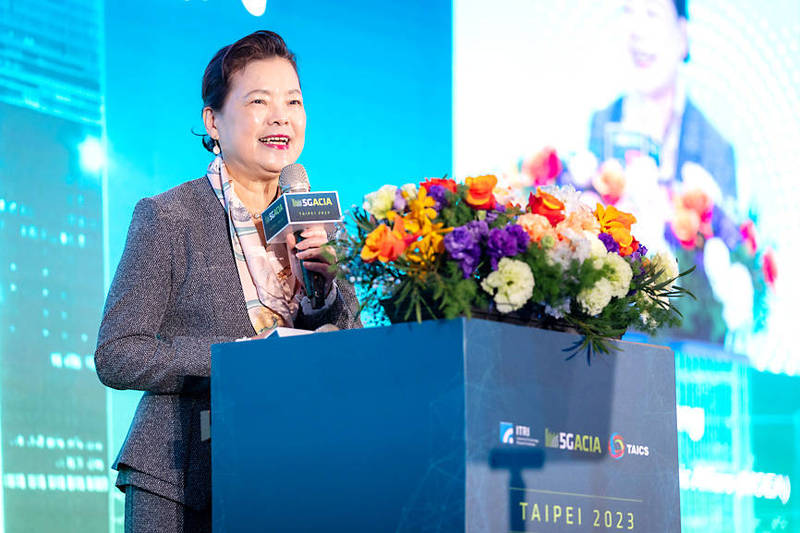《TAIPEI TIMES》 IC tech controls unlikely to affect local suppliers

Minister of Economic Affairs Wang Mei-hua speaks at a 5G Alliance for Connected Industries and Automation event in Taipei yesterday. Photo courtesy of Ministry of Economic Affairs
/ Staff writer, with CNA
A new list of core technologies, including semiconductor process technologies, that are subject to tighter controls is not likely to affect Taiwanese vendors, Minister of Economic Affairs Wang Mei-hua (王美花) said yesterday.
Speaking to reporters on the sidelines of a ceremony where an agreement was signed on the formation of a 5G alliance in Taiwan, Wang said that the government had discussions with local chipmakers before the list was released.
“I do not think the controls will have any negative impact on Taiwanese semiconductor suppliers,” Wang said. “Instead, the controls aim to protect [Taiwan-developed] critical technologies.”
On Tuesday, the National Science and Technology Council announced a set of 22 technologies subject to tight controls in five major areas: defense, aerospace, agriculture, semiconductors, and information and communications technology.
The 22 technologies include 14-nanometer and more advanced chipmaking process technologies and advanced IC packaging and testing technologies, including processes involving silicon photonics integration development and related specialty raw materials and equipment.
The National Security Act (國家安全法) stipulates that people who steal key technologies and leak them to China, Macau, Hong Kong or external hostile forces may be imprisoned for up to 12 years and fined up to two times the profit they garner.
Wang also cited the Act Governing Relations Between the People of the Taiwan Area and the Mainland Area (台灣地區與大陸地區人民關係條例), which states that companies that receive subsidies equal to more than 50 percent of their costs in developing critical technologies should secure approval before sending employees to China.
Industrial Development Administration Director-General Lien Ching-chang (連錦漳) on Tuesday said that Taiwan Semiconductor Manufacturing Co (TSMC, 台積電) is unlikely to be negatively affected by the technology controls.
TSMC deploys technologies in Taiwan that are more advanced than 14-nanometer processes, while in China it uses 14-to-16-nanometer processes, which account for 10 to 12 percent of its total sales.
“I don’t expect TSMC to be bothered by the newly announced technology controls,” Lien said, adding that the controls on 14-nanometer or more advanced processes were in line with international standards, referring to the US.
Taiwan accounts for more than 70 percent of global production of 14-nanometer and more advanced chips.
Smaller contract chipmaker United Microelectronics Corp (UMC, 聯電) said it would follow the new tech controls, adding that 14-nanometer process technology deployment is limited to Taiwan, while it uses 22 and 28-nanometer processes in China.
Taiwan Institute of Economics Research researcher Arisa Liu (劉佩真) said the government’s move to tighten controls on critical technologies is needed, as Taiwan not only has to build a local semiconductor supply chain, but also must prevent leaks, in particular at a time when China is keen to poach Taiwanese engineers.
新聞來源:TAIPEI TIMES













